
Iran’s chief nuclear negotiator Ali Larijani attends a news conference in Tehran April 13, 2006 (REUTERS)
WASHINGTON (AP) – Secretary of State Condoleezza Rice says the United States “would look at the full range of options” available to the U.N. Security Council to respond to Iran’s defiance of council resolutions concerning its nuclear program.
Rice told reporters Thursday there will “have to be some consequence” for Iran’s refusal to suspend uranium enrichment activities, as the Security Council president demanded in a statement two weeks ago.
Rice spoke to reporters after a meeting with Canadian Foreign Minister Peter MacKay.
“There is no doubt that Iran continues to defy the will of the international community despite the fact that the international community very clearly said stop,” Rice said.
One option, she said, is the ability to compel Iran through provisions under Chapter 7 of the UN Charter. These provisions permit measures to ensure that the will of the international system is carried out.
MacKay said Iran must comply with Security Council resolutions “and send a signal they are listening. We are hopeful Iran is going to get the message.” He said the international community must speak with one voice to get Iran to comply or risk sanctions.
Earlier Thursday, several top U.S. intelligence officials said that Iran remains years away from obtaining the materials and technology necessary for a nuclear weapon despite its announcement this week that it has begun enriching uranium.
Kenneth Brill, the head of the newly created National Counterproliferation Center, said the U.S. assessment on the timeframe of Iran’s weapons development was sufficiently broad that it does not need to be modified.
Senior intelligence officials alternatively say Tehran will have a nuclear weapon within a decade, or within several years. “What the Iranians have announced, is what they’ve announced,” said Brill, speaking alongside nine senior intelligence officials at a discussion of the Office of the National Intelligence Director’s first year. “They need to let the (International Atomic Energy Agency) inspectors in there to see it, because they have obligations.” He noted that the regime has blustered before about developments that did not readily materialize.
“We really have to see what’s happened in Iran,” Brill said. “There is still a very significant amount of time that needs to be worked through by the Iranians to get to where they want to go.”
Defending the quality of intelligence assessments, Brill said much of what the intelligence agencies have predicted has been validated by the IAEA and others.
U.S. intelligence officials are scrubbing their information and analysis on Iran as tensions increase over its nuclear program. Tehran insists its work is solely for peaceful, civilian purposes, but the U.S. and a number of its allies believe it is after a nuclear arsenal.
The nation’s No. 2 intelligence official, Gen. Michael Hayden, said the Iran intelligence has benefited from the lessons-learned exercises on estimates about Iraq’s weapons of mass destruction.
Based on all the data available to spy agencies, he said confidently that Iran is intent on developing a nuclear weapon. Over time, he added, “We are able to be more clear.” He declined to offer specifics about the information, or the gaps in information.
The top U.S. intelligence analyst, Thomas Fingar, said changes have been made in how analysis is done. “All of us have greater confidence in the judgments that we are making and bringing forward on Iran,” Fingar said. He said the various intelligence agencies took to heart the various reports on the flawed intelligence leading up to Iraq. “We get it,” Fingar said. “We realize we have got to rebuild confidence.”

Mohamed ElBaradei, head of the IAEA, looks at his watch as he leaves at the conclusion of a meeting and a joint press conference with Iran’s top nuclear negotiator, Ali Larijani, unseen, in Tehran, Iran, April 13, 2006 (AP)

A crowd of Iranian women carry portraits of Iran’s President Mahmoud Ahmadinejad during his visit to the town of Kashmar in Iran’s northeastern province of Khorassan, 13 April 2006 (AFP)
